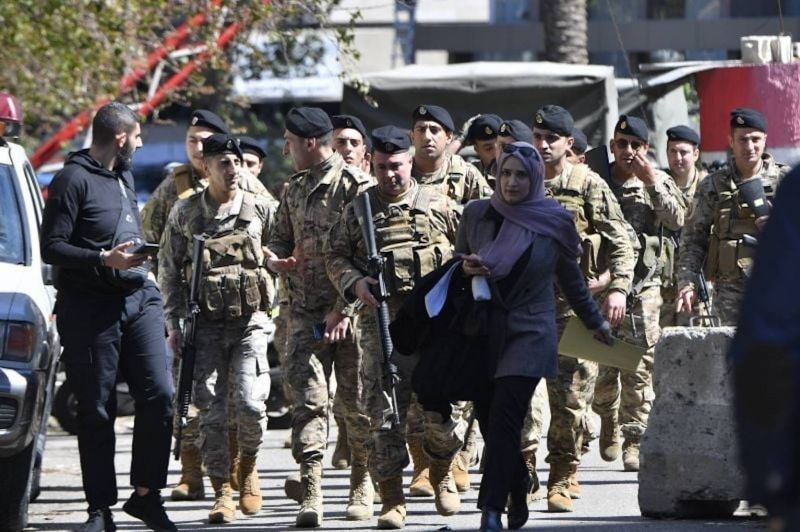
A large army deployment was seen around the courthouse Thursday. (Credit: Hussam Shbaro)
The security forces’ deployment near the Justice Palace 10:30 am Thursday was impressive. Central Bank Governor Riad Salameh arrived in a convoy of black cars, went to the fifth floor and entered the State Shura Council chamber where he gave testimony as a witness in a European probe into alleged financial malfeasance.
It is the first time that the BDL governor appeared before the European judges, who arrived in Lebanon for the second time. He refused to comply with the first summons Wednesday. Salameh’s lawyer submitted a petition that his client not be questioned by European judges. This was rejected by the first investigating judge in Beirut, Charbel Abu Samra, who is acting on behalf of the European court's request. Thus, a new session was scheduled for the next day.
For nearly six hours, with a 10-minute break every two hours, Salameh answered 100 of the European investigators’ prepared questions, which judge Abu Samra asked in Arabic. Abu Samra is expected to ask the witness another 100 questions at Friday’s hearing, before the European judges return home Saturday morning. They are set to return later for the questioning of Raja Salameh, and his former assistant Marianne Hoyek.
Rumors that voices were raised during the questioning seem to be inaccurate. A senior judicial source — banned from speaking to the press on the record — told L’Orient-Le Jour that the atmosphere was not tense and that, in any case, the room where the hearing took place is located at the end of a long corridor, to which only the parties concerned had access. No sound could be heard from outside.
The principal member of the European delegation, French investigating judge Aude Buresi is representing her country, Belgium and Luxembourg. She was accompanied by officials from the French Embassy, an interpreter and a clerk.
Germany was represented by its consul in Lebanon. He was accompanied by two investigators and a German interpreter. The German judge that came with the delegation in January was transferred without being replaced.
Also present, the head of the Committee of Cases Helene Iskandar, who pressed charges on Salameh Wednesday as part of the Lebanese judiciary’s case, was flanked by three judges, Reem Hajjar, Jad Hashem and Alvin Abou Diwan.
Behind closed doors
To preserve the secrecy of the investigation the hearing was held in camera and neither questions nor answers were revealed to the press.
A judicial source told AFP that Salameh “denied any suspicion of money laundering.” Speaking to L’Orient-Le Jour, a judge contented himself with saying that each answer was “useful.” The questions, he said, were very “probing.”
Why, then, was Salameh not accompanied by a lawyer? The anonymous judge replied that the questions were addressed to the BDL governor personally. Even if a lawyer were present, Salameh would not have been allowed to consult him before answering, nor would the lawyer have been allowed to respond on his client’s behalf.
Another judge suggested that “the fact that Riad Salameh showed up alone is a strategy designed to strengthen his position in the eyes of the European investigators,” insinuating that the BDL governor is claiming that he is innocent of all European charges against him.
A judicial source also told L’Orient-Le Jour that Judge Iskandar filed a lawsuit Thursday as part of the investigation conducted in France. The French investigating judge had recently warned her that if the state did not file a lawsuit, the Lebanese state would be unable to claim the assets of Salameh and his associates — which would be confiscated in the event of conviction — but will be claimed by the the two existing plaintiffs: the Collective Association of Victims of Fraudulent and Criminal Practices in Lebanon and Sherpa.
Head of litigation and advocacy at Sherpa Chanez Mensous told L'Orient-Le Jour that the assets confiscated in Europe can in no way benefit the associations that have filed civil suits in the case. "We have no vocation to recover the funds since no legal way allows us to do so," Mensous said. "The obligation of restitution that falls to the French state is intended for the Lebanese population and not for French civil society," she added, stressing that Sherpa led a fight for over 20 years to achieve, in 2021, the adoption of a law to create a mechanism for the restitution of assets of corruption to the robbed populations.
The French judge had specified that if the government does not have enough money to pay for a lawyer defending it in France, French law provides for legal assistance: the French president of the Bar Association can appoint a lawyer for the Lebanese state gratis. Judge Iskandar had informed caretaker Finance Minister Youssef Khalil of Judge Buresi’s proposal and insisted on the need to file a lawsuit. As this story went online, the state was unable to take advantage of this opportunity, according to information obtained by L’Orient-Le Jour, since Khalil had not responded to Iskander’s note. Judge Iskandar’s launching an overseas case is no surprise, since a judicial source revealed two days ago her willingness to accept the assistance of the French president of the bar association and to file a lawsuit in France.
It is an odd situation to have a state judge suing the state’s central bank governor. A judge commented on this remark, saying that “the legal entity of a state official is not the same as that of the state.” It goes without saying, for him, that Lebanon files a lawsuit to be compensated for damages suffered due to alleged acts of corruption, such as money laundering or illicit enrichment perpetrated by a state official.
This story originally ran in French in L’Orient-Le-Jour, translated by Joelle Khoury.